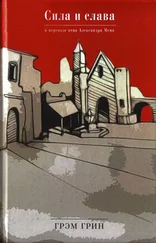Грэм Грин - The Comedians
Здесь есть возможность читать онлайн «Грэм Грин - The Comedians» весь текст электронной книги совершенно бесплатно (целиком полную версию без сокращений). В некоторых случаях можно слушать аудио, скачать через торрент в формате fb2 и присутствует краткое содержание. Год выпуска: 1966, Жанр: Классическая проза, на английском языке. Описание произведения, (предисловие) а так же отзывы посетителей доступны на портале библиотеки ЛибКат.
- Название:The Comedians
- Автор:
- Жанр:
- Год:1966
- ISBN:нет данных
- Рейтинг книги:3 / 5. Голосов: 1
-
Избранное:Добавить в избранное
- Отзывы:
-
Ваша оценка:
- 60
- 1
- 2
- 3
- 4
- 5
The Comedians: краткое содержание, описание и аннотация
Предлагаем к чтению аннотацию, описание, краткое содержание или предисловие (зависит от того, что написал сам автор книги «The Comedians»). Если вы не нашли необходимую информацию о книге — напишите в комментариях, мы постараемся отыскать её.
The Comedians — читать онлайн бесплатно полную книгу (весь текст) целиком
Ниже представлен текст книги, разбитый по страницам. Система сохранения места последней прочитанной страницы, позволяет с удобством читать онлайн бесплатно книгу «The Comedians», без необходимости каждый раз заново искать на чём Вы остановились. Поставьте закладку, и сможете в любой момент перейти на страницу, на которой закончили чтение.
Интервал:
Закладка:
Jones looked at me, but I could give him little help. 'Captain,' I said, 'you know how they treat prisoners here. Surely you can stretch a rule …'
His white nightshirt, embroidered around the neck and cuffs, perhaps by that formidable wife of his, had a horribly judicial air; he looked down at us from the height of his bunk as from a bench. 'Mr Brown,' he said, 'I have my career to consider. I must return here every month. Do you think that at my age the company would give me another command, on another route? After an indiscretion such as you propose?'
Jones said, 'I'm sorry. I never thought of that,' with a gentleness which surprised, I think, the captain just as much as it surprised me, for when the captain spoke again it was almost as though he were offering an excuse.
'I do not know whether you have a family, Mr Jones. But I certainly have.'
'No, I have no one,' Jones admitted. 'No one at all. Unless you count a bit of tail here and there. You're right, captain, I'm expendable. I'll have to sort this out some other way.' He brooded a little, while we watched him, then suddenly suggested, 'I could stow away if you'd turn a blind eye.'
'In that case I would have to hand you over to the police in Philadelphia. Does that suit you, Mr Jones? I have an idea there are people in Philadelphia who want to ask you questions.'
'It's nothing serious. I owe a little money, that's all.'
'Of your own?'
'On second thoughts perhaps it wouldn't suit me all that well.'
I admired Jones's calm: he might have been a judge himself, sitting in chambers with two experts in a tricky Chancery case.
'The choice of action seems to be strictly limited,' he summed the problem up.
'Then I would suggest again the British Embassy,' the captain said in the chill voice of one who always knows the correct answer and expects no disagreement.
'You're probably right. I didn't get on with the consul in Leopoldville very well, that's the truth. And they all come out of the same stable — Career out of Diplomatic Bag. I'm afraid they'll have a report on me here too. It's a problem, isn't it? You really would be bound to hand me over to the coppers in Philadelphia?'
'I'd be bound to.'
'It's just as short as it's long, isn't it?' He turned to me. 'What about some other embassy where there'd be no report …?'
'These things are governed by diplomatic rules,' I said. 'They couldn't claim a foreigner had the right of asylum. They'd be stuck with you for keeps, as long as this government lasted.'
Steps came rattling up the companionway. A hand knocked on the door. I saw Jones catch his breath. He wasn't nearly so calm as he tried to show.
'Come in.'
The second officer entered. He looked at us without surprise as though he expected to find strangers. He spoke to the captain in Dutch, and the captain asked him a question. He replied with his eye on Jones. The captain turned to us. As though he had at last abandoned the hope of Maigret for the night he put his book down. He said, 'There's a police officer at the gangway with three men. They want to come on board.'
Jones gave a deep unhappy sigh. Perhaps he was watching Sahib House and the 18th hole and the Desert Island Bar disappearing for ever.
The captain gave an order in Dutch to the second officer who left the cabin. He said, 'I must get dressed.' He balanced shyly on the edge of the bunk like a hausfrau, then heavily descended.
'You're letting them come on board?' Jones exclaimed. 'Where's your pride? This is Dutch territory, isn't it?'
'Mr Jones, if you will please go into the toilet and keep quiet, it will be easier for all of us.'
I opened a door at the end of the bunk and pushed Jones through. He went reluctantly. 'I'm trapped here,' he said, 'like a rat,' then altered the phrase quickly to 'a rabbit, I mean,' and gave me a frightened smile. I sat him firmly down like a child on the lavatory seat.
The captain was pulling his trousers on and tucking in his nightshirt. He took a uniform jacket off a peg and put it on — the nightshirt was concealed by the collar.
'You're not going to let them search?' I protested. He had no time to reply or to put on his shoes and socks before the knock came on the door.
I knew the police officer who entered. He was a real bastard, as bad as any of the Tontons Macoute; a man as big as Doctor Magiot and one who wielded a terrific punch; many broken jaws in Port-au-Prince testified to his strength. His mouth was full of gold teeth, probably not his own: he carried them as an Indian brave used to carry scalps. He looked at us both with insolence, while the second officer, a pimply youth, hovered nervously behind. He said to me, the words like an insult, 'I know you.'
The little captain looked very vulnerable in his bare feet, but he replied with spirit, 'I don't know you.'
'What are you doing on board at this hour?' the policeman said to me.
The captain said in French to the second officer so that his meaning was clear to everyone, 'I thought I told you he was to leave his gun behind?'
'He refused, Sir. He pushed me on one side.'
'Refused? Pushed?' The captain drew himself up and almost reached the negro's shoulder. 'I invited you on board but only on conditions. I am the only man allowed to carry arms on this ship. You are not in Haiti now.'
That phrase spoken with conviction really disconcerted the Officer. It was like a magic spell — he felt unsafe. He looked around at all of us, he looked around the cabin. 'Pas а Haпti?' he exclaimed, and I suppose he saw only the unfamiliar, a framed certificate on the wall for saving life at sea, a photograph of a grim white woman with iron-grey waves in her hair, a stone bottle of something called Bols, a photograph of the Amsterdam canals ice-bound in winter. He repeated distractedly, 'Pas а Haпti?'.
'Vous кtes en Hollande,' the captain said with a masterly laugh as he held out his hand. 'Give me your revolver.'
'I am under orders,' the bully said miserably, 'I am.doing my duty …'
'My officer will return it to you when you leave the ship.'
'But I am looking for a criminal.'
'Not in my ship.'
'He came here in your ship.'
'I am not responsible for that. Now give me your revolver.'
'I must search.'
'You can search all you like on shore but not here. Here I am responsible for law and order. Unless you give me your revolver I shall call the crew to disarm you and afterwards I will have you pitched into the harbour.'
The man was beaten. His eye was drawn to the disapproving face of the captain's wife as he unbuttoned his holster and handed over his gun. The captain put it in her charge. 'Now,' he said, 'I am prepared to answer any reasonable questions. What is it you want to know?'
'We want to know if you have a criminal on board. You know him — a man called Jones.'
'Here is a passenger-list. If you can read.'
'His name will not be on it.'
'I have been captain on this line for ten years. I stick to the letter of the law. I will never carry a passenger who is not on that list. Nor a passenger without an exit-visa. Has he an exit-visa?'
'No.'
'Then I can promise you, lieutenant, that he will never be a passenger in this ship.'
The sound of his rank seemed to mollify the police officer a little. 'He may be hidden,' he said, 'without your knowledge.'
'In the morning before sailing I will have the ship searched, and if he is found, I shall put him ashore.'
The man hesitated. 'If he is not here,' he said, 'he must have gone to the British Embassy.'
'It would be a more natural place,' the captain said, 'than the Royal Netherlands Steamship Company.' He handed the revolver to the second officer. 'You will give it him,' he said, 'at the foot of the gangway.' He turned his back and left the officer's black hand floating in mid-air like a catfish in an aquarium.
Читать дальшеИнтервал:
Закладка:
Похожие книги на «The Comedians»
Представляем Вашему вниманию похожие книги на «The Comedians» списком для выбора. Мы отобрали схожую по названию и смыслу литературу в надежде предоставить читателям больше вариантов отыскать новые, интересные, ещё непрочитанные произведения.
Обсуждение, отзывы о книге «The Comedians» и просто собственные мнения читателей. Оставьте ваши комментарии, напишите, что Вы думаете о произведении, его смысле или главных героях. Укажите что конкретно понравилось, а что нет, и почему Вы так считаете.



